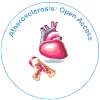当社グループは 3,000 以上の世界的なカンファレンスシリーズ 米国、ヨーロッパ、世界中で毎年イベントが開催されます。 1,000 のより科学的な学会からの支援を受けたアジア および 700 以上の オープン アクセスを発行ジャーナルには 50,000 人以上の著名人が掲載されており、科学者が編集委員として名高い
。オープンアクセスジャーナルはより多くの読者と引用を獲得
700 ジャーナル と 15,000,000 人の読者 各ジャーナルは 25,000 人以上の読者を獲得
インデックス付き
- Google スカラー
- レフシーク
- ハムダード大学
- エブスコ アリゾナ州
- パブロン
- ICMJE
役立つリンク
オープンアクセスジャーナル
このページをシェアする
抽象的な
MCP-1 Mediated Wound Injury Repair and Activation of Endothelium
Kim Weber, Peter Nelson, Hermann-Joseph Grone, Christian Weber
Reverse transcription- polymerase chain reaction, RNase protection, Western blot, and flow cytometric analysis showed that human umbilical vein endothelial cells express mRNA and surface protein of the monocyte chemotactic protein-1 (MCP-1) receptor CCR2, which was upregulated by inflammatory cytokines. MCP-1 induced migration of endothelial cells in a transwell assay, which was inhibited by the 9-76 MCP-1 receptor antagonists. Increased secretion of MCP-1 or interleukin-8, but not RANTES, on endothelial injury suggested a functional role of CCR2 in wound repair as measured by ELISA. After mechanical injury to endothelial monolayers, which spontaneously closed within 24 hours, wound repair was delayed by the 9-76 antagonists and by a blocking monoclonal antibody to MCP-1, but not to interleukin-8, and was improved by exogenous MCP-1. This was confirmed by quantification of cell migration into the wound area, whereas proliferation and viability were unaltered by MCP-1 or its analogue. Notably, immunohistochemistry of inflamed tissue revealed CCR2 staining on arterial, venous, and venular endothelium affected by cellular infiltration. This is the first demonstration of endothelial CCR2 expression ex vivo, inferring its involvement in inflammatory conditions. Thus endothelial cells express functional CCR2 that may have important implications for endothelial wound repair and inflammatory reactions.

 English
English  Spanish
Spanish  Chinese
Chinese  Russian
Russian  German
German  French
French  Portuguese
Portuguese  Hindi
Hindi